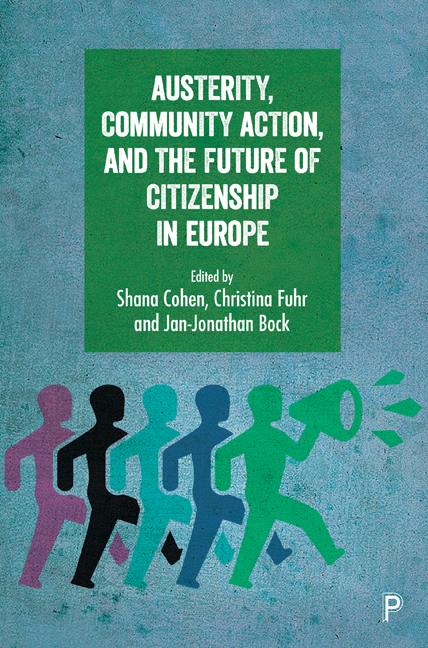Book contents
- Frontmatter
- Dedication
- Contents
- Acknowledgements
- Notes on contributors
- one Introduction: social activism, belonging and citizenship in a period of crisis
- Part I The social consequences of welfare policy
- Part II The practice of social good
- Part III Social change and neoliberalism
- Part IV Situating solidarity in perspective
- Index
Three - Social division and resentment in the aftermath of the economic slump
Published online by Cambridge University Press: 05 April 2022
- Frontmatter
- Dedication
- Contents
- Acknowledgements
- Notes on contributors
- one Introduction: social activism, belonging and citizenship in a period of crisis
- Part I The social consequences of welfare policy
- Part II The practice of social good
- Part III Social change and neoliberalism
- Part IV Situating solidarity in perspective
- Index
Summary
This chapter analyses the social impact of hard-time experiences of the economic downturn in 2008 that engulfed the rich world in a similar fashion to the Great Depression of the 1930s. The standard definition of recessions – two successive quarters of negative growth – fails to capture the harsh realities of those affected and ignores the social repercussions associated with austere times. The arguments put forward are the following: the recent recession (increasingly referred to as the Great Recession) has, as the worst economic slump since the Second World War, adequately been labelled the ‘nastiest recession’ to date, as it has hit groups already fighting socioeconomic vulnerability disproportionately (Tunstall and Fenton, 2009; Clark and Elgenius, 2014; Clark and Heath, 2014). Moreover, our findings of hard-time experiences account for patterns of hardship – due to cuts in welfare provisions and squeeze in income – alongside an unequalising trend for (always widely dispersed) wealth to increase relative to Gross Domestic Product (GDP) over time. Thus, hard-time experiences have persisted despite signs of a recovering economy since 2014, and the rhetoric of ‘being in it together’ and the associated One Nation politics appears incorrect at best. The shared experiences or shared burdens implied with the One Nation concept stray far from our material. In a similar fashion, references to a ‘Big Society’ or to ‘communities’ and ‘hardhit communities’ must be used with caution for reasons that will be explained. Our empirical findings highlight that social relations are undermined by austerity, as division, resentment and (some dimensions of) isolation follow the aftermath of the recession. The most salient patterns of our material show resentment between those in work, resenting the benefits of those without work, and those without work on benefits resenting other sub-groups on different benefits.
Project background and methodology
This work builds on the social capital discourse in relation to the economic crisis and its social implications in the UK and the US, and is a product of the research collaboration Social Change: A Harvard-Manchester Initiative based at the Institute of Social Change at Manchester, directed by Robert Putnam and Ed Fieldhouse. This text draws on the British findings and the part of the programme coordinated by Anthony Heath.
- Type
- Chapter
- Information
- Austerity Community Action and the Future of Citizenship , pp. 39 - 62Publisher: Bristol University PressPrint publication year: 2017

